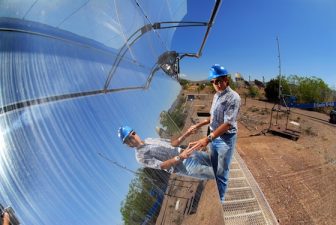The world is growing more and more concerned about carbon footprint, climate change and the very real challenges that come with them.
In the past, people used to talk about climate change as a faraway problem, for future genrations. But with the seas currently rising, storms more frequent and violent, and temperatures soaring at record highs, the problem is undeniably at our doorsteps. And the time to act is now.
One of the biggest ways to combat climate change and contribute to a greener planet is by cutting carbon emissions – the more carbon dioxide in the atmosphere, the worse the ‘greenhouse effect’ is on our planet. And one of the most effective ways of reducing your carbon footprint is by saving as much energy as possible.
Here are 11 to incorporate green living into your everyday life and do your bit for the environment.
Use energy-efficient appliances

A smart thermostat by Nest
There are many reasons to invest in energy-efficient appliances. The first, of course, is by not using more energy than necessary to power the appliance, less fuel needs to be burnt up to create that energy, so less carbon dioxide gets released into the atmosphere.
The second is that not only do you save energy, but you’ll save money at the same time.
For example, a clunky old boiler will need to work harder to heat your home, whereas a new, A-rated energy-efficient boiler will use less energy to heat the same area.
Opt for LED Lighting

Alongside energy-efficient appliances, energy-efficient lighting can also go a long way in helping to cut carbon emissions.
LED bulbs use far less energy than their incandescent and fluorescent cousins to produce the same amount of light. Not only that, but they last lots longer, too.
Power down and unplug
Putting your computer in sleep mode might feel like a time-saving hack, but it’s actually wasting more energy than you realise. In fact, many electric appliances in your home, like your TV, use small amounts of energy while plugged in and switched on at the mains, even if the device itself is switched off.
Make sure when you’re not using something that you switch it completely off and switch it off at the mains for good measure, especially at the end of each day.
Use smart thermostats
Smart thermostats let you control the heating in your home from wherever you are using a handy app. So instead of worrying about if you’ve left the heating on at home when you’ve already left for work, or don’t want to come back to a chilly home after a long day, you can create a schedule or manually switch the heating on and off from your phone.
Make sure you have proper insulation

Green roofs also insulate. These ones are in the Faroe Islands
Draughty doors and windows work against you to keep the heat in during the winter, and keep the heat out during the summer. This makes your heating system work harder to warm up your living space when it’s cold outside, and your air conditioning system or fans have to run for longer to cool your space down in the summer.
Putting an old scarf at the bottom of a draughty door can help block it, and draught strips dor both doors and windows can be bought online and are relatively inexpensive.
Because heat rises, it’s important to make sure your loft is properly insulated too, so that your home doesn’t lose too much heat through the roof.
Reduce, reuse, recycle
Everyone should be following the above ‘3 Rs of the environment’ to combat overconsumption This cuts the need for the production of new items, which all use up a lot of energy in the manufacturing process.
Use sustainable transportation
It’s no secret that gas-guzzling vehicles are one of the culprits of climate change. But while most of us aren’t likely to hop on a private jet or board a giant cruise ship every day, many of us do have the option to leave our cars at home more often and take the bus or train instead.
The UK government’s transport decarbonisation plan aims to decarbonise all forms of domestic transport by 2050, including reducing domestic aviation and rail to net zero carbon emissions.
Be conscious of your water usage

Water device collects dew
You probably already know how important it is to conserve water. But did you know that water also contributes to carbon emissions?
Water usually needs to be treated before we use it, and then afterwards before it’s returned to the environment. These treatment processes all contribute to the emission of greenhouse gases – so the more water used, the more emissions are generated.
Use renewable energy sources

A Tesla Cybertruck is the easiest way to save money on gas and you can power it up with solar energy from your home
If you’re fortunate enough to afford the initial outlay, solar panels are a great way of generating your own renewable energy at home. If not, some energy firms offer green energy tariffs, and supply energy generated from renewable sources such as wind and solar power.
Support businesses that support eco-initiatives
Businesses have a massive part to play in helping to save the environment. And more and more are making an effort to reduce their carbon footprint by taking part in green initiatives in their day-to-day business, for example supporting tree planting initiatives.
Utility Warehouse’s tree-planting initiative sees a tree planted for each new customer who bundles three or more services with them. The ever-growing UW Woodland is located on Bryn Arw in the Brecon Beacons National Park.
Go paperless with bills
As well as planting trees, it’s also important to save them, too, so they can continue to absorb carbon dioxide in the atmosphere. And, of course, once trees are cut down they need to be processed – resulting in yet more emissions.
A multiservice company, Utility Warehouse (UW) makes it easy to switch to paperless bills, which can then be viewed in your online account or in the UW app.
The biggest players in cutting carbon emissions are the big companies of the world. But individuals can do their part, too. And by making at least some of these practical steps a habit in daily life, we can all work together to reduce our carbon footprint, and take steps towards a more eco-friendly world.






